本篇博客是之前看到关于面试的一道SQL题 拿来学习了一下 看完看完本篇博客,相信你会对SQL语法有不一样的感觉和认识。
版本说明
mysql8.0
😍 一、行转列
🍀需求
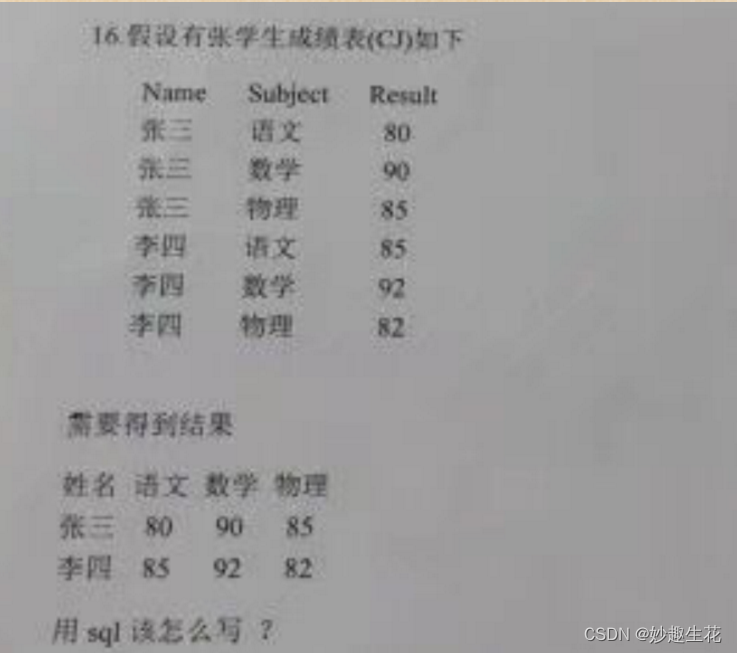
🚩 经典case when实现
select
name,
max(case subject when '语文' then resuilt else 0 end) '语文',
max(case subject when '数学' then resuilt else 0 end) '数学',
max(case subject when '物理' then resuilt else 0 end) '物理'
from student group by name
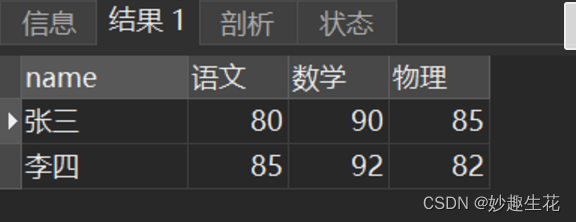
🚩 使用if语句
大体同case when
select name,
max(if(subject = '语文',resuilt,0)) '语文'
from student group by name
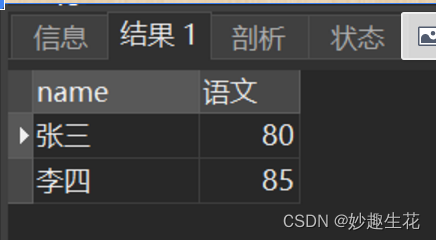
🚩 动态拼接sql语句,不管多少行都会转列
set @sql = null;
select group_concat(distinct concat('max(if(a.subject = ''',a.subject,''', a.resuilt, 0)) as ''',a.subject, '''')) into @sql from student a;
set @sql = concat('select name,', @sql, 'from student a group by a.name' );
prepare stmt from @sql; -- 动态生成脚本,预备一个语句
execute stmt; -- 动态执行脚本,执行预备的语句
deallocate prepare stmt; -- 释放预备的语句

扩展分析
mysql的列转行为什么一定要用sum 或者max
遇到这种问题我们可以通过调试sql,来解决我们遇到的疑惑。
😍 二、列转行
🍀需求
将
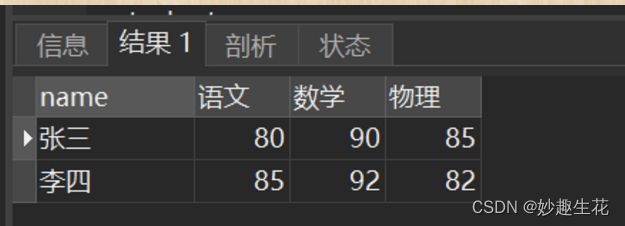
转换为

select
name,
'语文' as subject,
chinese as resuilt
from** -- 注意这里正常应该是from后直接跟一个表 偷懒不想创建表结构 直接用的子查询(行转列的代码)**
(select
name,
max(case subject when '语文' then resuilt else 0 end) 'chinese',
max(case subject when '数学' then resuilt else 0 end) 'math',
max(case subject when '物理' then resuilt else 0 end) 'physics'
from student group by name
) t
union all
select
name,
'数学' as subject,
math as resuilt
from** -- 注意这里正常应该是from后直接跟一个表 偷懒不想创建表结构 直接用的子查询(行转列的代码)**
(select
name,
max(case subject when '语文' then resuilt else 0 end) 'chinese',
max(case subject when '数学' then resuilt else 0 end) 'math',
max(case subject when '物理' then resuilt else 0 end) 'physics'
from student group by name
) t
union all
select
name,
'物理' as subject,
physics as resuilt
from** -- 注意这里正常应该是from后直接跟一个表 偷懒不想创建表结构 直接用的子查询(行转列的代码)**
(select
name,
max(case subject when '语文' then resuilt else 0 end) 'chinese',
max(case subject when '数学' then resuilt else 0 end) 'math',
max(case subject when '物理' then resuilt else 0 end) 'physics'
from student group by name
) t
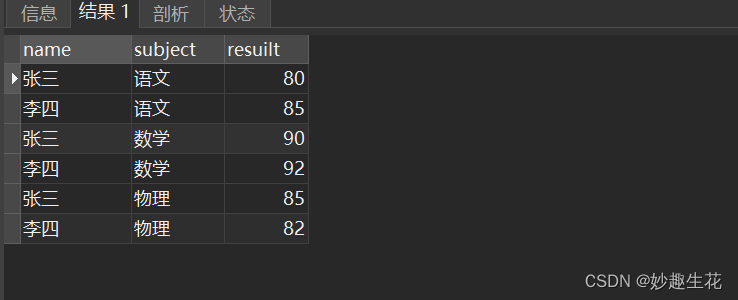
总结
行转列,使用case…when分情况查询数据,group by和sum/max进行筛选
列转行,查询需要的每列数据使用union或者union all求并集
😍 三、多列转一行
🍀需求
将

变为

select name,GROUP_CONCAT(subject,':',resuilt) '成绩' from student group by name

GROUP_CONCAT(expr)该函数将非空列值按照分组条件进行合并并最终返回。如果有空值,则返回为空
😍 四、一行转多列
🍀需求
将

变为
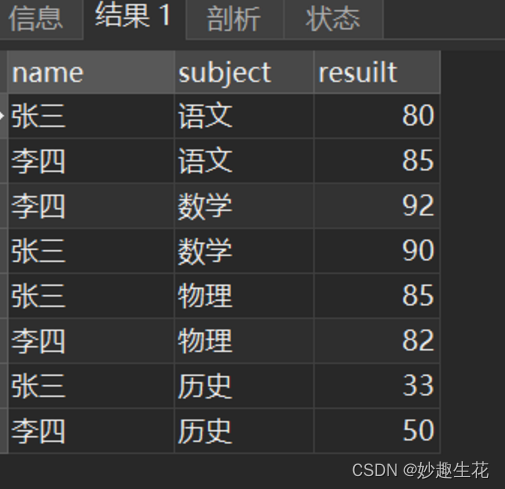
** a表**
select
name,
marks,
case
when locate('语文',marks) > 0 then substring_index(substring_index(marks,'语文:',-1),',',1) else 0 end
as 语文 ,
case
when locate('数学',marks) > 0 then substring_index(substring_index(marks,'数学:',-1),',',1) else 0 end
as 数学 ,
case
when locate('物理',marks) > 0 then substring_index(substring_index(marks,'物理:',-1),',',1) else 0 end
as 物理 ,
case
when locate('历史',marks) > 0 then substring_index(substring_index(marks,'历史:',-1),',',1) else 0 end
as 历史
from
(select
name,
GROUP_CONCAT(subject,':',resuilt) marks
from
student group by name) a

上面只是第一步 举例 要求还差一步 使用union all 继续加工sql
b表
select
name,
'语文' subject,
语文 score
from
(a表) b
union all
select
name,
'数学' subject,
数学 score
from
(a表) b
union all
select
name,
'物理' subject,
物理 score
from
(a表) b
union all
select
name,
'历史' subject,
历史 score
from
(a表) b
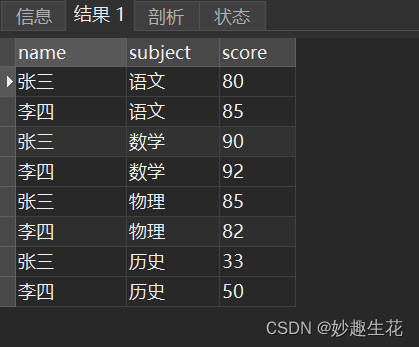
Locate函数主要的作用是判断一个字符串是否包含另一个字符串,如
Locate(str,sub) > 0,表示sub字符串包含str字符串;
Locate(str,sub) = 0,表示sub字符串不包含str字符串。
substring_index(参数str,参数delim,参数count)
str :要处理的字符串
delim:分隔符
count:计数
也就是说,如果count是正数,那么就是从左往右数,第N个分隔符的左边的全部内容! 相反,如果是负数,那么就是从右边开始数,第N个分隔符右边的所有内容,
参考文章
mysql行转列,列转行,以及为什么行转列的时候用max函数_一朵风中摇曳的水仙花的博客-CSDN博客_max函数 行转列
浅析MySQL中concat以及group_concat的使用 - 程序员大本营
MySQL函数Locate的使用_今夜无风亦无雨的博客-CSDN博客_mysql的locate
MySQL中的substring_index()函数使用方法与技巧_极客小俊的博客-CSDN博客_mysql substring_index
版权归原作者 妙趣生花 所有, 如有侵权,请联系我们删除。